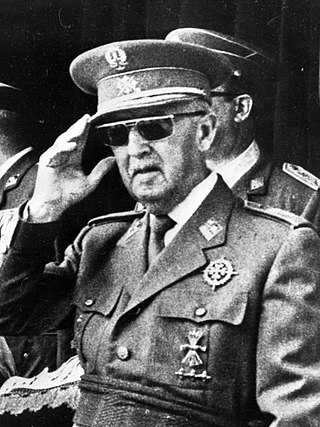Top Qs
Timeline
Chat
Perspective
Generalissimo
Military rank of the highest degree From Wikipedia, the free encyclopedia
Remove ads
Generalissimo[1] (/ˌdʒɛn(ə)rəˈlɪsɪmoʊ/ JEN-(ə-)rə-LIS-ih-moh), also generalissimus, is a military rank of the highest degree, superior to field marshal and other five-star ranks in the states where they are used.


Remove ads
Usage
Summarize
Perspective
The word generalissimo (pronounced [dʒeneraˈlissimo]), an Italian term, is the absolute superlative of generale ('general') thus meaning "the highest-ranking of all generals". The superlative suffix -issimo itself derives from Latin -issimus,[2][3][4][5][6] meaning "utmost, to the highest grade". Similar cognates in other languages include generalísimo in Spanish, generalíssimo in Portuguese, généralissime in French, and generalissimus in Latin. The Russian word генералиссимус, generalissimus comes from Latin.[7]
Historically, this rank was given to a military officer leading an entire army or the entire armed forces of a state,[8] usually only subordinate to the sovereign.[9] Alternatively, those of imperial blood or the commanders-in-chief of several allied armies could gain the title.[10] The military leader Albrecht von Wallenstein in 1632 became the first imperial generalissimo (general of the generals) of the Holy Roman Empire. Other usage of the title has been for the commander of the united armies of several allied powers (such as Ferdinand Foch on the Western Front in 1918 or Joseph Stalin on the Eastern Front in 1945), or if a senior military officer becomes a chief of state or a head of government (like Chiang Kai-shek in the Republic of China or Francisco Franco in Spain).
The rank generalissimus of the Soviet Union would have been a generalissimo but some sources assert that Joseph Stalin refused to accept the rank.[11][12] In fact the grade was established by the Presidium of the Supreme Soviet, which did not need the approval of Stalin.[13] The rank of generalissimo for Stalin was used also by Western diplomacy.[14]
In the 20th century, the term came to be associated with military officers who took dictatorial power in their respective countries, especially due to the Spanish leader Francisco Franco having this rank. As such, it is used in literature depicting fictional Latin American dictatorial regimes, for example Father Hilary's Holiday by Bruce Marshall.[15]
Remove ads
List of generalissimos
Remove ads
See also
Notes
- The Napoleonic Marshal of France Jean Baptiste Bernadotte, Prince of Ponte Corvo, was elected Crown Prince of Sweden by the Riksdag of the Estates and King Charles XIII in 1810. Given his exalted French military rank, the rank of generalissimus was likely granted him in order to give him precedence over "mere" Swedish field marshals. Once he became King of Sweden and Norway in 1818, the generalissimus rank became superfluous.
Remove ads
References
Wikiwand - on
Seamless Wikipedia browsing. On steroids.
Remove ads
